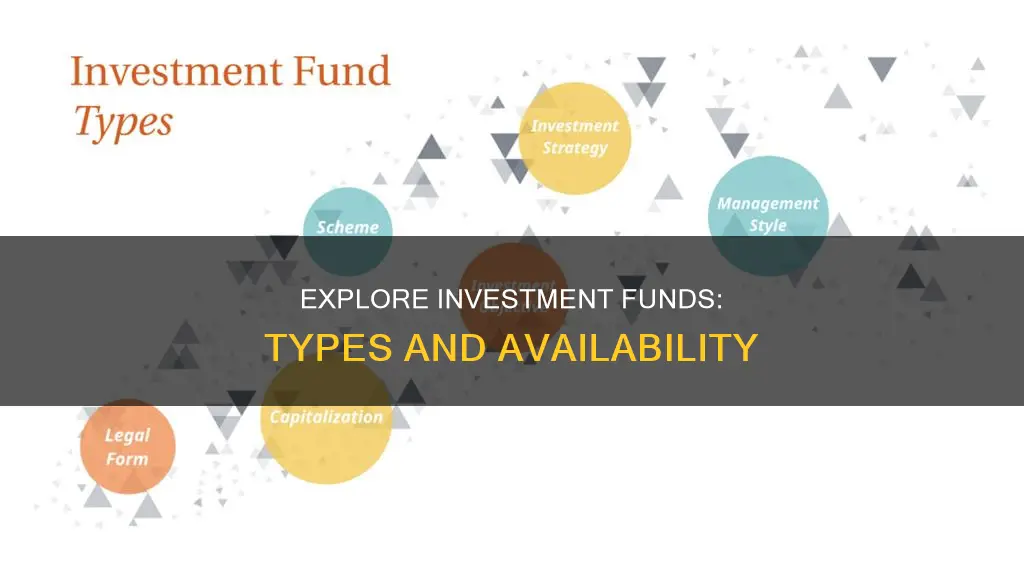
There are several types of investment funds available, each with its own advantages and disadvantages. The most common types of investment funds include mutual funds, exchange-traded funds (ETFs), money market funds, and hedge funds. Mutual funds are investment vehicles that pool money from multiple investors to purchase a diversified portfolio of stocks, bonds, or other securities. ETFs are similar to mutual funds but are traded on stock exchanges and priced continuously throughout the day. Money market funds invest in high-quality, short-term debt instruments and cash equivalents, while hedge funds are actively managed funds that invest in a variety of asset classes using different strategies. Other types of investment funds include index funds, which are a type of mutual fund that tracks a specific market index, and target-date funds, which are mutual funds that automatically shift their risk profile over time.
| Characteristics | Values |
|---|---|
| Type | Mutual Funds, Exchange-Traded Funds (ETFs), Money Market Funds, Hedge Funds, Stocks, Bonds, Index Funds, Options, Cryptocurrencies, NFTs, Sustainable & Impact Investing, etc. |
| Management | Actively Managed Funds, Passively Managed Funds |
| Investment Style | Diversified Portfolios, Balanced Funds, Fixed-Income Funds, Growth Funds, Value Funds, Blend Funds, etc. |
| Risk | Low, Medium, High |
| Returns | Interest, Dividends, Capital Gains |
| Fees | Management Fees, Administrative Costs, Marketing Expenses, Redemption Fees, Exchange Fees, etc. |
| Taxation | Taxed Yearly, Taxed on Profit, Tax-Deferred |
| Accessibility | Open-End, Closed-End |
What You'll Learn

Mutual funds
There are several benefits to investing in mutual funds. Firstly, they offer diversification, allowing investors to reduce risk by mixing investments and assets within their portfolio. Secondly, mutual funds provide access to professionally managed portfolios, which can be beneficial for those who don't have the time or expertise to manage their investments actively. Mutual funds also offer economies of scale, as the pooled capital allows for lower transaction costs compared to investing individually. Additionally, mutual funds are highly liquid, making it easy for investors to buy and sell their shares.
When investing in mutual funds, it's important to consider the fees associated with them, as these can significantly impact overall returns. Mutual funds typically charge annual fees, expense ratios, or commissions, which can vary depending on the fund. It's also worth noting that mutual funds are traded only once daily after the markets close, and redemptions can only take place at the end of the trading day.
There are various types of mutual funds, including stock funds, money market funds, bond funds, and target-date funds. Stock funds invest primarily in equity or stocks, with subcategories based on the size of the companies they invest in or their investment approach. Money market funds focus on short-term debt instruments and are often used as a temporary holding place for cash. Bond funds invest in government bonds, corporate bonds, and other debt instruments, offering a consistent and minimum return. Target-date funds, also known as life cycle funds, are popular for retirement savings as they automatically shift their risk profile to a more conservative approach over time.
Overall, mutual funds offer a versatile and accessible way for investors to diversify their portfolios and benefit from professional management. By pooling money from multiple investors, mutual funds provide access to a wider range of investment opportunities.
Offshore Investment Funds: Global Wealth Management Strategy
You may want to see also

Exchange-traded funds (ETFs)
ETFs are similar to index funds in that they track a benchmark index and aim to mirror its performance. They are also cheaper than mutual funds because they are not actively managed. ETFs are bought and sold from other owners throughout the day on stock exchanges, whereas mutual funds are bought and sold from the issuer based on their price at the end of each trading day.
ETFs are professionally managed by SEC-registered investment advisers. Some ETFs are passively managed funds that seek to achieve the same return as a particular market index, while others are actively managed funds that buy or sell investments consistent with a stated investment objective.
ETFs can be bought and sold at current market prices at any time during the trading day, unlike mutual funds, which can only be traded at the end of the trading day. ETFs can be traded frequently to hedge risk or implement market timing investment strategies, whereas many mutual funds have restrictions on frequent trading.
ETFs can be used to manipulate market prices, as seen in the United States bear market of 2007-2009. New regulations were put in place following the 2010 flash crash, but these proved inadequate to protect investors in the August 2015 flash crash. ETFs were consequently put under even greater scrutiny by regulators and investors.
The largest ETFs, which passively track stock market indices, have annual expense ratios as low as 0.03% of the amount invested, although specialty ETFs can have annual fees of 1% or more of the amount invested. These fees are paid to the ETF issuer out of dividends received from the underlying holdings or from the sale of assets.
Climate Fund Investment: Steps to Take Action
You may want to see also

Hedge funds
There are four common types of hedge funds:
- Global Macro Hedge Funds: These funds aim to profit from broad market swings caused by political or economic events. They take large positions in shares, bonds, or currencies in anticipation of global macroeconomic events.
- Equity Hedge Funds: These funds may be global or specific to one country. They invest in lucrative stocks while hedging against downturns in equity markets by shorting overvalued stocks or stock indices.
- Relative Value Hedge Funds: These funds seek to exploit temporary differences in the prices of related securities, taking advantage of price or spread inefficiencies.
- Activist Hedge Funds: These funds aim to invest in businesses and take actions to boost the stock price, such as demanding cost-cutting, restructuring assets, or changing the board of directors.
Hedge Fund Insights: EDGAR Investment Info Source
You may want to see also

Money market funds
The funds work like a typical mutual fund, issuing redeemable units or shares to investors and following guidelines set by financial regulators. Shareholders can usually withdraw their money at any time, but there may be a limit on how many times they can withdraw within a certain period.
- Prime Money Fund: Invests in floating-rate debt and commercial paper of non-Treasury assets, which may be issued by corporations, government agencies, or government-sponsored enterprises (GSEs).
- Government Money Fund: Invests a minimum of 99.5% of its assets in cash, government securities, and repurchase agreements that are fully backed by cash or government securities.
- Tax-Exempt Money Fund: Offers earnings that are free from US federal income tax and, depending on the securities, may also be exempt from state income taxes. Municipal bonds and other debt securities primarily constitute these funds.
While money market funds are considered safe, there is a possibility of losing money. They are not guaranteed or insured by the regional governments, and the principal value can fluctuate.
Bond Funds: A Beginner's Guide to Investing Wisely
You may want to see also

Cryptocurrencies & NFTs
Cryptocurrency and NFTs have become increasingly popular investment options in recent years. NFTs, or non-fungible tokens, are unique digital assets that act as secure documentation of ownership. They are built and managed on a blockchain, the same digital ledger technology system used by cryptocurrencies like Bitcoin and Ethereum. NFTs can be used to indicate ownership of digital assets like art, music, or video, but they can also be used for unique physical assets like property or collectibles.
The value of NFTs is highly volatile, and they can be bought and sold via NFT marketplaces, such as OpenSea, Rarible, SuperRare, and Foundation. Each marketplace has its own terms and conditions, including license agreements that determine the rights of the NFT buyer. It is important to thoroughly research any potential NFT purchase, as some projects sell NFTs without the actual creative or ownership rights of the digital asset.
For those interested in investing in cryptocurrencies, there are now several cryptocurrency exchange-traded funds (ETFs) available that can be traded like stocks on regular brokerage platforms. These ETFs provide investors with direct exposure to the underlying cryptocurrencies, which are securely held by custodians. Some examples of cryptocurrency ETFs include:
- IShares Bitcoin Trust (IBIT)
- Grayscale Ethereum Trust (ETHE)
- Cyber Hornet S&P 500 and Bitcoin 75/25 Strategy ETF (ZZZ)
- ProShares Bitcoin Strategy ETF (BITO)
- Roundhill Bitcoin Covered Call Strategy ETF (YBTC)
- Global X Blockchain ETF (BKCH)
- Global X Bitcoin Trend Strategy ETF (BTRN)
These cryptocurrency ETFs offer a simplified way to invest in cryptocurrencies and can be included in diversified portfolios and tax-advantaged accounts. However, it is important to note that they are limited to traditional trading hours, and there may be complexities and security concerns associated with self-custody and trading on cryptocurrency exchanges.
Overall, investing in cryptocurrencies and NFTs can provide access to a new asset class and potentially higher returns. However, it is a speculative investment, and the risks associated with the volatility and complexity of these assets should be carefully considered before making any investment decisions.
Roku's Investment Funds: Who's Backing the Streaming Giant?
You may want to see also
Frequently asked questions
There are several types of investment funds, including mutual funds, exchange-traded funds (ETFs), money market funds, and hedge funds. Mutual funds are a common choice for new investors as they allow for the creation of a diversified portfolio with a small investment amount. ETFs are priced continuously throughout the day and can be traded like stocks. Money market funds invest in high-quality, short-term debt instruments and cash equivalents. Hedge funds are actively managed funds that invest in a variety of asset classes using different strategies and face less federal regulation.
Investment funds provide investors with access to a broader range of investment opportunities, greater management expertise, and lower investment fees than they might be able to obtain on their own. They also allow for diversification, as investors can collectively purchase a wide variety of securities.
When choosing an investment fund, it is important to consider your investing goals and risk tolerance. You should examine funds that invest in assets that match your risk tolerance and look for funds with strong track records and low fees.







